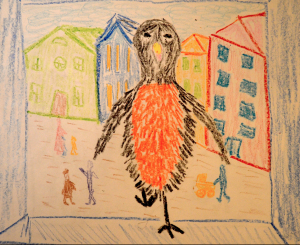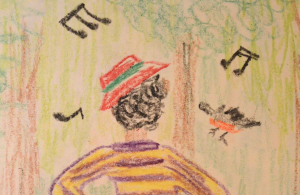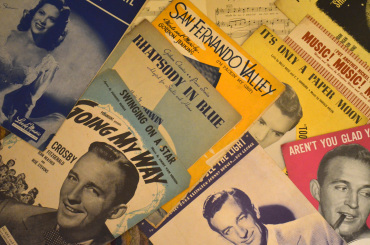By Sally Holland
Bagatelle sang superior songs. He was sought-after for ceremonies and celebrations. The Queen even summoned him when she felt sad. He never failed to raise her spirits.
He was short and simple, much like the music for which he was named. His body shape was that of a cello, his eyes were the dots of staccato, and his ears could have been formed from bass clefs. The stripes on his suit pants went one way while those on his suit coat went the other.
One spring day, he hummed a happy tune as he walked in the wood. A sudden wind came and the tall trees began to sway. Their branches cracked above. Mid-melody, Bagatelle looked straight up to see a bough falling. Before he could move, it walloped him on his head and knocked him to the ground. Then just as quickly as it had come, the windstorm left.
Bagatelle stood up and brushed off his suit. He tried to pick up his tune where he had left off yet he could not find it. He opened his mouth to belt out a ballad but barely a sound came forth. He hopped and spun to inspire a song. Instead of making a melody, he neighed like a disheartened horse.
His music had been knocked right out of him!
Back in his village, he explained what happened to anyone who would listen. The villagers convinced him that a witch who wanted to ruin his singing must have thrown the branch. They told him there was nothing to be done about it. He would never be able to sing again.
Without his music, Bagatelle saw no reason to leave his home. He sat in his most comfortable rocker and stared out the window all day, every day. He watched men try to one-up each other and women sharply criticize one another. Sisters pinched their brothers before running for cover. Brothers made their mothers shudder. It was an angry world, Bagatelle discovered. He convinced himself that he was lucky because by staying at home, he only watched that world and never had to experience it.
Toward the end of the summer, a robin landed on his windowsill and proceeded to tap on the window with a regular beat. Bagatelle opened the window to shoo the bird away. Puffing up his red chest, the robin tweeted at Bagatelle in a stern fashion.
“Go away!” said Bagatelle. He brushed the bird away.
The robin flapped his wings until he was just out of reach. As soon as Bagatelle sat back down, the bird returned to the windowsill. This time his tweets were both melodious and convincing as if he were trying to reason with Bagatelle. Unfortunately, Bagatelle did not speak the robin’s language so he had no idea what the bird was saying.
Bagatelle closed the window to keep him out.
 The stubborn bird again tapped on the glass in an irritating fashion until Bagatelle became frustrated and opened the window to shoo him away once more. The robin flapped his wings and flew out of reach until Bagatelle stopped waving his arm. Then the bird returned and started to trill.
The stubborn bird again tapped on the glass in an irritating fashion until Bagatelle became frustrated and opened the window to shoo him away once more. The robin flapped his wings and flew out of reach until Bagatelle stopped waving his arm. Then the bird returned and started to trill.
Bagatelle got tired of shooing the bird away long before the robin got tired of trilling.
Eventually, Bagatelle realized that the robin was repeating the same tune over and over. The song was simple with lovely lilts and wonderful warbles.
Bagatelle whistled the melody back to the robin. The bird nodded his head then flew away into the evening.
Bagatelle closed the window and went back to brooding about the behavior of the townspeople.
After that, the bird returned every day at dawn and stayed until dusk. He hopped around on the windowsill and tapped until Bagatelle opened the window. He whistled until Bagatelle repeated the same tune back to the bird. Every day the melodies got more elaborate and dynamic.
Bagatelle’s whistling improved until he could perform a complete stanza without taking a breath. He began to harmonize with the tunes that the robin produced. Their songs were simpatico.
The townspeople would slow down when they passed Bagatelle’s home so they could listen to their duets. Their spirits were lifted and they stopped bickering–for it’s hard to bicker when humming a tune. It was nearly impossible not to hum along with Bagatelle and the bird.
A few months after the bird first appeared, Bagatelle left his home. As he walked toward the woods, the robin landed on his shoulder and gently rubbed his beak against Bagatelle’s cheek. Bagatelle reached up and smoothed feathers on the bird’s head.
“Hold on tight. This may be a long trip,” he said. “I need to find the witch that threw the branch at my head. I want to thank her for taking away my music. For if she hadn’t, I would have never found you and I would never have found the wherewithal to whistle.”
The robin flapped his wings and settled in for the ride.
*** *** *** *** *** ***
The year of 2017 was a rough one for my parents and by extension our entire family. Dad was diagnosed with cancer and then heart problems. While in the hospital, he picked up a bacterial infection and truly believed that he was going to die. He didn’t, but he did lose his music.
Dad has a stereo system where he can play CDs, cassette tapes, records and his i-Pods. He records old radio shows that he finds on the internet and listens to them on his Walkman while sleeping. Dad has hundreds of records and CDs. His I-pods are color coded so that the gold one has 1930s and 1940s music and the silver one has classical. He has at least three 1980s era boom boxes in his bedroom that can play any of his formats. He has several more boom boxes squirreled away throughout the house to protect himself from unexpected format changes


Because of my father, my sisters and I were exposed to everything from the love songs of the 1920s to the silly songs of Spike Jones to college fight songs. I know the lyrics for Georgia Tech, Ohio State, and the University of Tennessee and can fumble my way through Navy and University of Wisconsin as well.
We learned to appreciate the creative lyrics of Gershwin and the cabaret renditions of Bobby Short. We learned about J. Fred Coots who wrote “Santa Claus is coming to Town.” He wrote a lesser known sequel called “He’ll Be Coming Down the Chimney.” My sisters and I know all the words.
After that last stay in the hospital, the music became too much for Dad to handle. He shifted to watching 24-hour news channels. Admittedly, this is the most interesting news environment of my lifetime, but too much news makes people angry with the world and my dad was no exception.
His return to music came slowly. It started with listening to the tapes of old radio shows on his Walkman at night when he was in bed. He tried to get his radio shows to play on his Kindle, but failed and that threw his confidence. He eventually let my sisters and me know that he couldn’t make it work. We figured out that it was a problem with the Kindle itself and solved that problem by purchasing a new one.
This Christmas Eve Dad didn’t think to turn on the stereo to play Christmas carols like he does every year. He seemed to have forgotten about Max’s Christmas tape.
Max was the father of my mother’s good friend. He was a kind man, very giving and extremely cheap. If there was a deal to be had, Max knew about it.
Years ago, Max checked out records from the library and recorded them onto cassettes for Dad. True to form, Max didn’t like to waste even an inch of tape, so he cut the beginnings and ends of the songs so closely that he often missed the first or last few notes of a song. Max managed to put his personality on those tapes. His Christmas tape has this silly song on it where all the animals in the manger say Merry Christmas in the own way i.e.: cow–Moo-erry Christmoos. As a family, we have laughed at that song for years.
On Christmas Eve, I went up to the attic–the primary storage area for Dad’s music–and located the tape. Dad and I listened to the song and spent a few minutes missing Max. Then we let the tape play and listened to the other Christmas carols on it. Television news was still on, but the volume was down.
After that, Dad seemed to take more of an interest in his stereo. He moved a chair in front of it so that if he got tired while choosing music, he had a place to sit down. He looked through his tapes and found ones that he particularly liked. He had me load the CD player. I found the remote so he could switch from CD to CD from his easy chair.
Since he hadn’t used the stereo for six months, Dad couldn’t remember exactly how it worked. I went through it a few times with him then wrote some general instructions for when I’m not there.
Before I left for home, he was back to playing music nearly full time. I apologized to Mom for reacquainting Dad with his stereo. I think she was much happier with the music than the angry people on the 24-hour news networks.
I’m not sure what the future will hold for Dad. His physical problems are still there. He is weak, and aging is not kind. My biggest wish is that his music will lift his spirits and make all of that bearable. Now that he has it back it seems to be working.
 My Dad several years ago.
Share this:
My Dad several years ago.
Share this:




